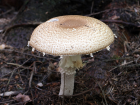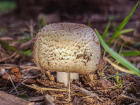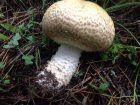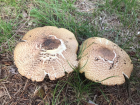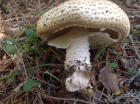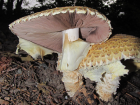Cap hemispherical during the so-called button stage, and then expands, becoming convex to broadly convex or nearly flat. The cap cuticle is dry and densely covered with concentrically arranged, brown-coloured scales on a white to yellow background. The flesh is thick, firm, and white and may discolour yellow when bruised. Gills are not attached to the stem, crowded and pallid at first, and turn pink then dark brown with maturity. Stem solid, cylindrical to club-shaped and no volva. Whitish and fairly bald above the membranous ring, but below the ring covered with whitish to faintly brownish scales. Spore print purple-brown.
Microscopic Features: The spores are ellipsoidal in shape, with a smooth surface. They measure approximately 7-10 μm in length and 4.5-6.5 μm in width.
Agaricus augustus on the First Nature Web site.
Agaricus augustus on the MushroomExpert.Com Web site.
The first photo is by George Chernilevsky under the Public domain license.
Many mushrooms are poisonous, and some can be lethally toxic. Distinguishing between edible and poisonous mushrooms can be very challenging. Therefore, we strongly advise against consuming wild mushrooms. This website does not contain any information about the edibility or toxicity of mushrooms.
Although efforts have been made to ensure accuracy on this website, the information may contain errors and omissions. Therefore, all content provided is for educational and informational purposes only and should not be relied upon or used as a basis for consuming any plants or mushrooms.
External links are provided for reference only. We do not endorse or take responsibility for the content, advice, or products found on these sites or in any advertisements shown on this website.
